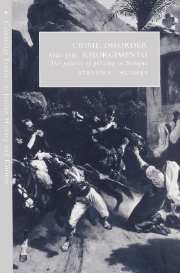Book contents
- Frontmatter
- Contents
- List of illustrations and tables
- Acknowledgments
- List of abbreviations and note on footnotes
- Map 1 Primary political divisions of the Papal States in 1842
- Map 2 Legation of Bologna 1821
- Introduction
- 1 Setting the stage: Bologna, the ancien régime, and Napoleon
- 2 Consalvi's cops
- 3 Functions and failures (1815–1831)
- 4 Public order and the revolution of 1831
- 5 Reform and failure (1832–1847)
- 6 Reform and revolution (1847–1849)
- 7 The search for stability and the turn to Piedmont (1849–1859)
- 8 Epilogue: Risorgimento, freedom, and repression
- 9 Conclusion
- Appendix A Personnel plans of Bologna's Provincial Police, 1816–1863
- Appendix B The pattern of crime in Bologna, 1819–1846
- Index
6 - Reform and revolution (1847–1849)
Published online by Cambridge University Press: 06 July 2010
- Frontmatter
- Contents
- List of illustrations and tables
- Acknowledgments
- List of abbreviations and note on footnotes
- Map 1 Primary political divisions of the Papal States in 1842
- Map 2 Legation of Bologna 1821
- Introduction
- 1 Setting the stage: Bologna, the ancien régime, and Napoleon
- 2 Consalvi's cops
- 3 Functions and failures (1815–1831)
- 4 Public order and the revolution of 1831
- 5 Reform and failure (1832–1847)
- 6 Reform and revolution (1847–1849)
- 7 The search for stability and the turn to Piedmont (1849–1859)
- 8 Epilogue: Risorgimento, freedom, and repression
- 9 Conclusion
- Appendix A Personnel plans of Bologna's Provincial Police, 1816–1863
- Appendix B The pattern of crime in Bologna, 1819–1846
- Index
Summary
At the end of 1846 Bologna had embarked on a new experiment in self-policing designed to control crime while progressive reforms came to grips with the perceived roots of the problem. Within two and one half years, however, the Austrians would come marching back into the city under the banner of law and order, a dramatic testament to the failure of that experiment and of the reform movement as a whole. Yet, so full were those fateful years of rhetoric, patriotism, and revolution, that they have fallen rather too easily into a single unit of political explanation that pits moderates against radicals, constitutionalists against republicans, and Austrians against all in a tight ideological framework. Whatever the analytical utility of this neat political package, it tends to obscure the continuity of previous problems through the entire period, especially for Bologna, which was far distant from the epicenter of political change in Rome.
At no time, however, would Bologna's internal contradictions and conflicts, which had given rise to the Citizen Patrols, become more apparent and disturbing than under the pressure of external events both national and international. With war and revolution, crime in Bologna would come forth with a violence and frequency that seemed to justify the fears, complaints, and precautions that had permeated the political climate before and after the accession of Pius IX. In many ways the situation would be analogous to that of 1831, but this time the city would not be in charge of its own destiny and it would suffer the consequences as local interests gave way before greater political issues.
- Type
- Chapter
- Information
- Crime, Disorder, and the RisorgimentoThe Politics of Policing in Bologna, pp. 168 - 202Publisher: Cambridge University PressPrint publication year: 1994



